| Listing 1 - 6 of 6 |
Sort by
|
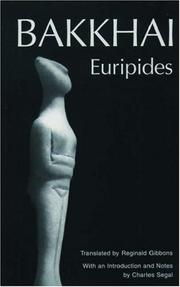
ISBN: 1280830964 0199725934 9780199725939 0195125983 9780195125986 0195125975 0199880816 0197704336 Year: 2001 Publisher: Oxford ; New York : Oxford University Press,
Abstract | Keywords | Export | Availability | Bookmark
 Loading...
Loading...Choose an application
- Reference Manager
- EndNote
- RefWorks (Direct export to RefWorks)
Euripides' Bakkhai is a staple of the canon of Greek tragedy, as its structure and thematics offer exemplary models of the classic tragic elements. The plot centres around the actions of Pentheus, King of Thebes, who refused to recognise Dionysus.
Pentheus (Greek mythology) --- Bacchantes --- Dionysus --- Bacchus --- Bakchos --- Dionís --- Dionisas --- Dioniso --- Dionīss --- Dionisu --- Dioniz --- Dionizi --- Dionizo --- Dionizos --- Dionüszosz --- Dionysos --- Dionýzos --- Diyonizosse --- Διόνυσος --- Дионис --- ديونيسوس --- 디오니소스 --- דיוניסוס --- ディオニューソス --- 狄俄倪索斯 --- Βάκχος --- Діоніс --- Dionysus (Greek deity) --- Pentheus, --- Penthée, --- Πενθεύς, --- Τενθεύς, --- Tentheus, --- Greek drama (Tragedy) --- Euripides.
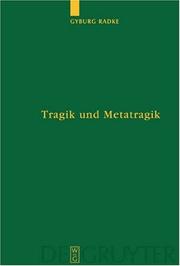
ISBN: 3110180227 3110913291 Year: 2003 Volume: 66 Publisher: Berlin ; New York Walter de Gruyter
Abstract | Keywords | Export | Availability | Bookmark
 Loading...
Loading...Choose an application
- Reference Manager
- EndNote
- RefWorks (Direct export to RefWorks)
What is the tragic in Euripides' Bacchae? A nowadays predominant view sees it in the self-reflexion of the genus 'tragedy' and the medium 'theatre': The presence of the theatre god Dionysos on stage turns the tragic of the Bacchae into metatragic. In contrast, by carefully scrutinizing the premises of structuralist methods applied and by interpreting the complete text of the play, Gyburg Radke reads the Bacchae as a 'textbook example' of an Aristotelian tragedy evoking fear and pity, in which the combination of the individual character of the protagonist Pentheus and of his failure constitutes the tragic quality of the plot. Worin liegt die Tragik der Bakchen des Euripides? - Eine heute dominierende Forschungsrichtung meint: in der reflexiven Selbstthematisierung der Gattung Tragödie und des Mediums Theater. Das Auftreten des Theatergottes Dionysos bedeutet, im Sinn dieses strukturalistischen Ansatzes, die Erhebung der Tragik der Bakchen zur Metatragik. Die hier vorgelegte Untersuchung stellt durch eine allgemeine hermeneutische Reflexion auf die Prämissen der Anwendung strukturalistischer Methoden und durch eine vollständige Textinterpretation der Bakchen eine Gewinn- und Verlustbilanz metatheatralischer Deutungen auf. Sie liest die Bakchen als Gegenthese dazu als 'Schulbeispiel' einer Furcht- und Mitleidtragödie, in der der Zusammenhang zwischen dem individuellen Charakter des Protagonisten Pentheus und seinem Scheitern die tragische Qualität der Handlung ausmacht.
Tragedie --- Tragedy --- Tragédie --- Treurspel --- Bacchantes in literature. --- Dionysia in literature. --- Dionysus (Greek deity) in literature. --- Pentheus (Greek mythology) in literature. --- Tragedy. --- Tragic, The, in literature. --- Bacchantes in literature --- Dionysia in literature --- Dionysus (Greek deity) in literature --- Pentheus (Greek mythology) in literature --- Tragic, The, in literature --- Drama --- Euripides. --- Euripides --- Pentheus, --- Dionysus --- In literature. --- Bacchus --- Bakchos --- Dionís --- Dionisas --- Dioniso --- Dionīss --- Dionisu --- Dioniz --- Dionizi --- Dionizo --- Dionizos --- Dionüszosz --- Dionysos --- Dionýzos --- Diyonizosse --- Διόνυσος --- Дионис --- ديونيسوس --- 디오니소스 --- דיוניסוס --- ディオニューソス --- 狄俄倪索斯 --- Βάκχος --- Діоніс --- Penthée, --- Πενθεύς, --- Τενθεύς, --- Tentheus,
Book
ISBN: 1783740833 1783740825 1783740841 2821884044 178374085X 9781783740840 9781783740857 9781783740864 1783740868 9781783740833 9781783740826 9782821884045 Year: 2016 Publisher: Open Book Publishers
Abstract | Keywords | Export | Availability | Bookmark
 Loading...
Loading...Choose an application
- Reference Manager
- EndNote
- RefWorks (Direct export to RefWorks)
This extract from Ovid's 'Theban History' recounts the confrontation of Pentheus, king of Thebes, with his divine cousin, Bacchus, the god of wine. Notwithstanding the warnings of the seer Tiresias and the cautionary tale of a character Acoetes (perhaps Bacchus in disguise), who tells of how the god once transformed a group of blasphemous sailors into dolphins, Pentheus refuses to acknowledge the divinity of Bacchus or allow his worship at Thebes. Enraged, yet curious to witness the orgiastic rites of the nascent cult, Pentheus conceals himself in a grove on Mt. Cithaeron near the locus of the ceremonies. But in the course of the rites he is spotted by the female participants who rush upon him in a delusional frenzy, his mother and sisters in the vanguard, and tear him limb from limb. The episode abounds in themes of abiding interest, not least the clash between the authoritarian personality of Pentheus, who embodies 'law and order', masculine prowess, and the martial ethos of his city, and Bacchus, a somewhat effeminate god of orgiastic excess, who revels in the delusional and the deceptive, the transgression of boundaries, and the blurring of gender distinctions. This course book offers a wide-ranging introduction, the original Latin text, study aids with vocabulary, and an extensive commentary. Designed to stretch and stimulate readers, Gildenhard and Zissos's incisive commentary will be of particular interest to students of Latin at AS and undergraduate level. It extends beyond detailed linguistic analysis to encourage critical engagement with Ovid's poetry and discussion of the most recent scholarly thought.
Ovid, --- Criticism and interpretation. --- Ovidius Naso, Publius. --- Pentheus, --- Penthée, --- Πενθεύς, --- Τενθεύς, --- Tentheus, --- Nasó, P. Ovidi, --- Naso, Publius Ovidius, --- Nazon, --- Ouidio, --- Ovide, --- Ovidi, --- Ovidi Nasó, P., --- Ovidiĭ, --- Ovidiĭ Nazon, Publiĭ, --- Ovidio, --- Ovidio Nasón, P., --- Ovidio Nasone, Publio, --- Ovidios, --- Ovidiu, --- Ovidius Naso, P., --- Ovidius Naso, Publius, --- Owidiusz, --- P. Ovidius Naso, --- Publiĭ Ovidiĭ Nazon, --- Publio Ovidio Nasone, --- Ūvīd, --- אוביד, --- Humanities --- Rhetoric --- Language and languages --- Speaking --- Authorship --- Expression --- Literary style --- Learning and scholarship --- Classical education --- Ovid --- commentary --- metamorphoses --- vocabulary --- myth --- ovid --- latin literature --- Acoetes --- Dionysus --- Pentheus --- Thebes --- Greece
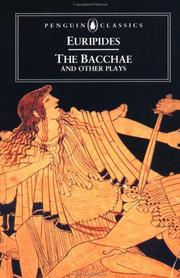
ISBN: 0140440445 9780140440447 Year: 1983 Publisher: Harmondsworth Penguin Books
Abstract | Keywords | Export | Availability | Bookmark
 Loading...
Loading...Choose an application
- Reference Manager
- EndNote
- RefWorks (Direct export to RefWorks)
Classical Greek literature --- Bacchantes --- Euripides --- Pentheus, --- Dionysus --- Ion --- Hecuba, --- Helen, --- Ecuba, --- Hecabe, --- Hécube, --- Hekaba, --- Hekabē, --- Hekabo, --- Hekuba, --- 赫库芭, --- ヘカベー, --- הקובה, --- 헤카베, --- Гекаба, --- Гекуба, --- Хекаба, --- Хекуба, --- هکابه, --- هيكوبا, --- Ἑκάβη, --- Elena, --- Helena, --- Helenē, --- Yelena, --- 海伦 , --- ヘレネー, --- הלנה, --- העלענע, --- 헬레네, --- Хелена, --- Єлена, --- Елена , --- هلن, --- هيلين, --- Ἑλένη, --- Ió --- Iōnas --- Ione --- Jonas --- 伊昂 --- 이온 --- Јон --- Іон --- Йон --- إيون --- Ἴων --- Ἰωνας --- Bacchus --- Bakchos --- Dionís --- Dionisas --- Dioniso --- Dionīss --- Dionisu --- Dioniz --- Dionizi --- Dionizo --- Dionizos --- Dionüszosz --- Dionysos --- Dionýzos --- Diyonizosse --- Διόνυσος --- Дионис --- ديونيسوس --- 디오니소스 --- דיוניסוס --- ディオニューソス --- 狄俄倪索斯 --- Βάκχος --- Діоніс --- Penthée, --- Πενθεύς, --- Τενθεύς, --- Tentheus, --- Ėvripid --- Yūrībīdīs --- Euripide --- Euripedes --- Eŭripido --- Eurypides --- Euripidesu --- אוריפידס --- エウリーピデース --- Εὐριπίδης --- Translations into English.
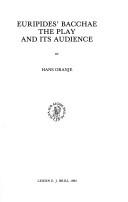
ISBN: 9004070117 900432805X 9789004070110 9789004328051 Year: 1984 Volume: 78 Publisher: Leiden E.J. Brill
Abstract | Keywords | Export | Availability | Bookmark
 Loading...
Loading...Choose an application
- Reference Manager
- EndNote
- RefWorks (Direct export to RefWorks)
The purpose of this book is to investigate what it was Euripides intended to convey to the theatre-going public of his day when he wrote his most exciting and most gruesome play, the Bacchae . The meanings which are to be attached to the action of a play are woven by an audience, both during and after the performance, into a single dramatic experience, labelled in this book as 'audience response'. After some introductory chapters dealing with the history of the interpretation of the Bacchae and with the theory of audience response, the main part of the book is devoted to a detailed analysis of the action of the play (chapters 4 and 5), and to a study of Dionysus in his various apects in Athenian life and in his appearances in earlier literature and on the tragic stage. The discussion of the choruses concentrates on the choruses' repeated utterances about cleverness and wisdom, which form the core of the Dionysian propaganda of the play. The most immediate results of this new interpretation of the Bacchae are that the widely-accepted view of Pentheus as a dark puritan, a man possessed by the Dionysian qualities of his divine opponent, proves to be untenable, and that that which in the past has been rightly called the overriding theme of the play - the god's epiphany - also contains the poet's most serious and ironical discussion of divinity and of man's treatment of it. The problems of the Greek text are given full discussion, mainly in the nots and appendices. In many cases new solutions are proposed; some new problems are however added.
Euripides --- Dionysos (Divinité grecque) dans la littérature --- Dionysus (Greek deity) in literature --- Dionysus (Griekse godheid) in de literatuur --- Greek drama (Tragedy) --- Bacchantes in literature --- Theater audiences --- Pentheus (Greek mythology) in literature --- Tragédie grecque --- Bacchantes dans la littérature --- Théâtre --- Penthée (Mythologie grecque) dans la littérature --- History and criticism --- History --- Histoire et critique --- Publics --- Histoire --- Euripides. --- Theater --- Pentheus, --- In literature --- -Theater audiences --- -Audiences, Theater --- Theatergoers --- Performing arts --- Theater attendance --- Dramatics --- Histrionics --- Professional theater --- Stage --- Theatre --- Acting --- Actors --- -Audiences --- Audiences --- -History --- -Euripides --- Euripide --- Tragédie grecque --- Bacchantes dans la littérature --- Dionysos (Divinité grecque) dans la littérature --- Théâtre --- Penthée (Mythologie grecque) dans la littérature --- Audiences, Theater --- Dionysus --- In literature. --- Bacchantes in literature. --- Literature. --- Theater. --- Theater audiences. --- Belles-lettres --- Western literature (Western countries) --- World literature --- Authors --- Authorship --- Penthée, --- Tentheus, --- Bacchus --- Bakchos --- Dionís --- Dionisas --- Dioniso --- Dionīss --- Dionisu --- Dioniz --- Dionizi --- Dionizo --- Dionizos --- Dionüszosz --- Dionysos --- Dionýzos --- Diyonizosse --- Πενθεύς, --- Τενθεύς, --- Διόνυσος --- Дионис --- ديونيسوس --- 디오니소스 --- דיוניסוס --- ディオニューソス --- 狄俄倪索斯 --- Βάκχος --- Діоніс --- Bacchae (Euripides) --- Bacchantes (Euripides) --- To 1500 --- Greece. --- al-Yūnān --- Ancient Greece --- Ellada --- Ellas --- Ellēnikē Dēmokratia --- Elliniki Dimokratia --- Grčija --- Grèce --- Grecia --- Gret͡sii͡ --- Griechenland --- Hellada --- Hellas --- Hellenic Republic --- Hellēnikē Dēmokratia --- Kingdom of Greece --- République hellénique --- Royaume de Grèce --- Vasileion tēs Hellados --- Xila --- Yaṿan --- Yūnān --- Philology --- Theater - History - To 500 --- Euripides - Bacchae --- Pentheus, - King of Thebes (Mythological character) - In literature --- Pentheus, - King of Thebes (Mythological character)
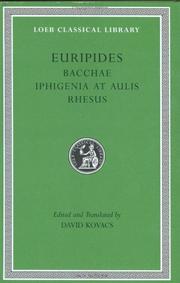
ISBN: 0674996011 9780674996014 Year: 2002 Volume: 495 Publisher: Cambridge: Harvard university press,
Abstract | Keywords | Export | Availability | Bookmark
 Loading...
Loading...Choose an application
- Reference Manager
- EndNote
- RefWorks (Direct export to RefWorks)
Euripides (c. 485-406 BCE) has been prized in every age for his emotional and intellectual drama. Eighteen of his ninety or so plays survive complete, including Medea, Hippolytus, and Bacchae, one of the great masterpieces of the tragic genre. Fragments of his lost plays also survive.
Rhesus (Legendary character) --- Iphigenia (Greek mythology) --- Pentheus (Greek mythology) --- Dionysus (Greek deity) --- Trojan War --- Bacchantes --- Euripides --- Rhesus, --- Dionysus --- Mythology, Greek --- Maenads --- Cults --- Dionysia --- Greek drama (Satyr play) --- Greek drama (Tragedy) --- Greek drama --- Mythology, Greek, in literature --- Tragedy --- Iphigenia --- Pentheus, --- Greek mythology --- Satyric drama, Greek --- Resas, --- Reso, --- Resos, --- Rhēsos, --- Ῥῆσος, --- Рес, --- Рез, --- Резос, --- Рэс, --- 레소스, --- レーソス, --- Penthée, --- Πενθεύς, --- Τενθεύς, --- Tentheus, --- Ifigeneia --- Ifigenia --- Ifigenija --- Ifigjenia --- Ifixenia --- Iphigeneia --- Iphigenie --- 伊菲革涅亚 --- イーピゲネイア --- איפיגניה --- 이피게네이아 --- Іфігенія --- Ифигенија --- Ифигения --- إيفيجينيا --- Ἰφιγένεια --- Ėvripid --- Yūrībīdīs --- Euripide --- Euripedes --- Eŭripido --- Eurypides --- Euripidesu --- אוריפידס --- エウリーピデース --- Εὐριπίδης --- Bacchus --- Bakchos --- Dionís --- Dionisas --- Dioniso --- Dionīss --- Dionisu --- Dioniz --- Dionizi --- Dionizo --- Dionizos --- Dionüszosz --- Dionysos --- Dionýzos --- Diyonizosse --- Διόνυσος --- Дионис --- ديونيسوس --- 디오니소스 --- דיוניסוס --- ディオニューソス --- 狄俄倪索斯 --- Βάκχος --- Діоніс --- Drama --- Greek literature --- Drama. --- Rhesus (Legendary character) - Drama. --- Iphigenia (Greek mythology) - Drama --- Pentheus (Greek mythology) - Drama. --- Dionysus (Greek deity) - Drama. --- Trojan War - Drama. --- Bacchantes - Drama. --- Bacchantes - Drama --- Euripides - Translations into English --- Rhesus, - King of Thrace (Legendary character) - Drama --- Dionysus - (Greek deity) - Drama --- Rhesus, - King of Thrace (Legendary character) --- Dionysus - (Greek deity)
| Listing 1 - 6 of 6 |
Sort by
|

 Search
Search Feedback
Feedback About UniCat
About UniCat  Help
Help News
News